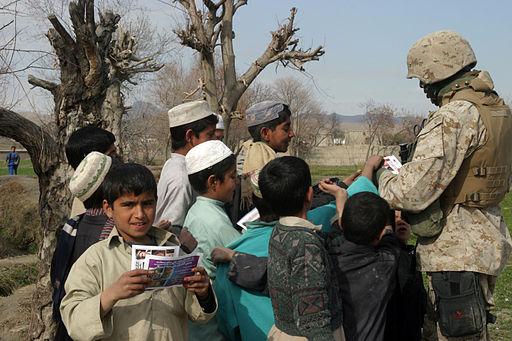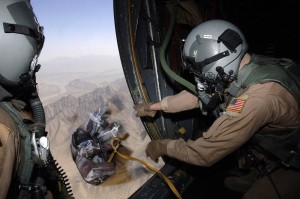
The Dollars and Dimes of Hearts and Minds
On Wednesday, USAToday published an article exploring the efforts to “win hearts and minds” in Afghanistan and Iraq. The authors, Tom Vanden Brook and Ray Locker, did a fantastic job in gathering information on the cost and activities of the military and its contractors in pursuing “information operations.” This is a rarely explored topic that deserves a lot of attention as a key aspect of our overall “war winning” strategy.
The article reveals a great deal about how we have pursued our goals (or lack thereof) in conflict zones over the past decade. According to the article,  spending on information operations reached upwards of $580 million in 2009, a number which may be staggering to professional public diplomacy practitioners. On top of that, exactly how that money is spent is not being disclosed, making it difficult to maximize its benefit.
spending on information operations reached upwards of $580 million in 2009, a number which may be staggering to professional public diplomacy practitioners. On top of that, exactly how that money is spent is not being disclosed, making it difficult to maximize its benefit.
More worrying than the actual dollar amount is who is spending it. For example, Leonie Industries, a company contracted to perform information operations for the military, was established in 2004 by a brother and sister pair who were previously involved in direct-to-video movies and advertising. It has received “at least $120 million in contracts in recent years.” Yet despite being involved with such a large amount of money, Leonie also neglected to pay for heating and medical care for its Afghan employees, until the Army “threatened to drop [its] contract.” How is it that the military trusts this company to help win hearts and minds?
Based on the information presented by Vanden Brook and Locker, the military appears to have a basic understanding of what many of the problems are with regards to communicating with foreign publics, but fails to understand how to connect all the dots to workable and effective solutions.
For instance, there is a general understanding that the U.S. lacks a certain amount of credibility when attempting turn minds in favor of its strategic goals. It understands that the messenger is important, but fails to understand that the message and the messenger must be on equal footing.
Rear Admiral Hal Pittman, who oversaw information operations in Afghanistan, is cited as stating:
“The honest truth is that because we are outsiders and not Muslim, we have a lower believability and credibility rating than people within the Afghan Government or Afghans.”
Pittman gets this only half correct. He correctly identifies the credibility issue of Americans, but falsely attributes the Afghan Government, which is rife with corruption, as having an effectively higher credibility rating. It may in fact be higher, but in absolute terms, it may still not be high at all.
Vanden Brook and Jackson rightly point out that “In Afghanistan, information operations campaigns are often used to bolster local officials, who are viewed with suspicion by many Afghans because of their ties to corruption.” Therein lies the problem.
If in the eyes of Afghans, both the U.S. military and Afghan Government aren’t credible messengers, what’s the best way to create a credible message in such volatile environments? According to the article, both the Pentagon and its contractors practice the dissemination of unattributed TV and radio content, posters, and billboards intended to counter Taliban propaganda, promote the Afghan government’s accomplishments, highlight the work of NGOs and recruit for the Afghan security forces.
 There are several problems with this strategy. Though separating the message from the Afghan government and the U.S. military is an appropriate tactic, issuing completely unattributed messages fails to create a captivating narrative and identifiable branding. If you are trying to sell an idea, then you need to sell it. Give it a brand, give it a voice, and demonstrate why your option is better than the opposing narrative. Give people a choice. If necessary, give the idea to a third party, whether that’s an NGO or newly created organization that can establish and carry the narrative.
There are several problems with this strategy. Though separating the message from the Afghan government and the U.S. military is an appropriate tactic, issuing completely unattributed messages fails to create a captivating narrative and identifiable branding. If you are trying to sell an idea, then you need to sell it. Give it a brand, give it a voice, and demonstrate why your option is better than the opposing narrative. Give people a choice. If necessary, give the idea to a third party, whether that’s an NGO or newly created organization that can establish and carry the narrative.
In a separate, but related article, Vanden Brook and Jackson note a 2008 effort by the U.S. Military to tap the popularity of Iraq Star, a hit show in Iraq similar to American Idol, by sponsoring it with pro-Iraqi-government messages. Though the plan fell through, it’s understandable why this was perceived to be a good idea, as there is value to tapping popular media in order to promote the maximum spread of a message. This is especially important given the inability of American-created media like Alhurra to generate a significant audience.
But in the case of Iraq, which has by all accounts struggled with unity and the ability to find a common voice of its own, Iraq Star was best left alone to thrive without outside interference. Iraq needed its own success story to survive on its own merits without being tainted.
Public diplomacy, strategic communication, or information operations — whichever label you want to give it — is suffering from a lack of professionalism. You cannot merely fill the communication vacuum with leaflets, advertisements and dollars. You must employ communication professionals who have the expertise to listen to and effectively understand their audience, comprehend the strategic goal, and can create material that resonates with the target audience. That is key.






[…] Holland: ASP Briefing: “Biofuels for National Security” […]
USA Today’s Tom Vanden Brook reported about the U.S “Info Ops” programs being “costly” but failed to mention the biggest perpetrator of the “Info Ops” program funded by the U.S government. Bell Pottinger a British public relations company has been the number one distribution of “Info Ops” in the Middle East since 2004. U.S government contracts awarded since January 2007 included a $199 million contract to Bell Pottinger and one for $26 million to Leone Industries a similar U.S based public relations company. Vanden Brook chose to focus on the issue of cost and doubiousity of the U.S “Info Ops” program by reporting and finger pointing Leone Industries as the main contributor to this so called problem.
The fact is that Tom Vanden Brook’s report is both misleading and contradictive by focusing on the small time U.S based public relations company owners personal home tax hardships in 2011 that has nothing to do with the “Costly” or “Dubious” task of U.S information operations. Why not list the Doubiousisms of the largest UK-based public relations consultancy measured by 2010 fee income since the U.S “Info Opps” spending peaked in 2009 ever wonder why? Let’s look at a time line of the war and Bell Pottinger’s ever so convenient U.S and Middle Eastern expansions In 2004 Bell Pottinger Communications USA was launched and in 2005 Bell Pottinger Middle East was launched with offices in Bahrain in 2009. Was the 2009 spending peak the U.S “Info Ops” program paying for a U.K public relations company office production in the Bahrain? Either way to point out the faults in the company’s owner personal life while stating the company is doing great and getting praise from the government is telling one pretzel of story..
Let’s look at the U.S “Info Opps” largest contract and most costly purveyors of information Bell Pottinger. December 5th 2011th British newspaper “The Independent” ran a front page story and revealed executives from Bell Pottinger boasting of ways in which they burnished the reputations of countries accused of human rights violations. Also Bell Pottinger once again came under public scrutiny in December after managers were secretly recorded talking to fake representatives of the Uzbek government and abusing Wikipedia by removing negative information and replacing it with positive spin. I ask you this, Do you want these “Info Opps” contracts to be granted to U.S Company’s with real U.S economy issues or foreign conglomerate giants with world scandals?
Whether it’s Leone Industries, or Bell Pottinger, both examples show the problems inherent with U.S. strategic communications and public diplomacy. One of the first rules of good public diplomacy is to tell the truth. This goes beyond the mere advocacy programs that contractors like these have been pushing.
The important issues identified in the article are the communication strategies we are using to accomplish our strategic goals. On that account, we are missing the point. Some finger pointing is certainly appropriate because it helps identify the problem. I have no issue with the authors choosing to use the Leonie example to highlight this. There may be examples of Leonie having done good work, but it has to be consistently good. The military must also justify the way it’s been choosing to spend its money. But if the military doesn’t understand how to effectively communicate, it may not be the best judge of the work that Leonie, or any other contractor, has been doing.
[…] in March, I blogged about a USAToday story on military information operations in Iraq and Afghanistan. Tom Vanden Brook and Ray Locker did […]
[…] in March, I blogged about a USAToday story on military information operations in Iraq and Afghanistan. Tom Vanden Brook and Ray Locker did […]